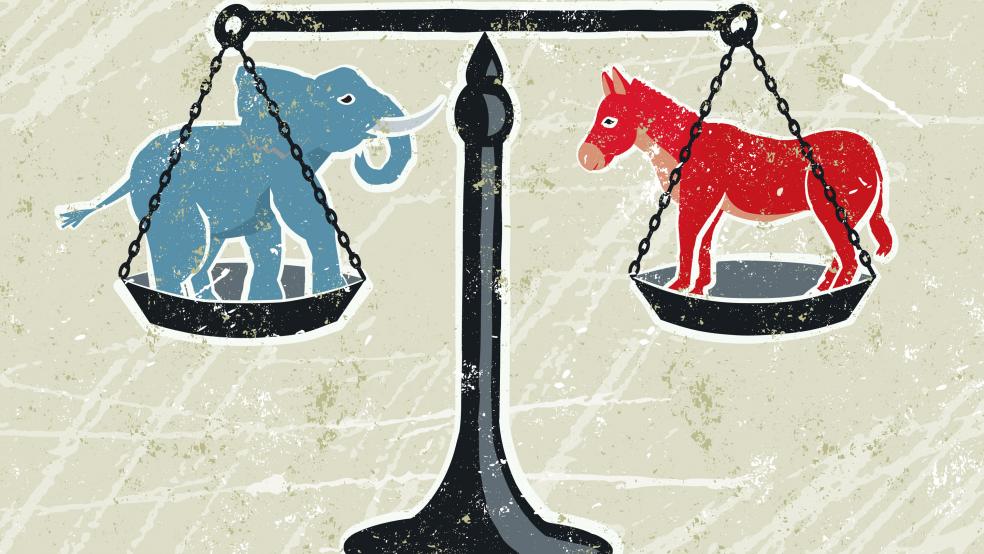Democrats’ prospects for winning back control of the House in 2014 never were good to begin with, but the sudden rash of announced retirements of veteran Democrats will make that effort even harder.
Just this week, Rep. George Miller of California and Rep. James P. Moran of Virginia announced they would not seek another term. Miller, first elected in 1974, is one of Congress’s foremost authorities on education and the right-hand man to House Minority Leader Nancy Pelosi. Moran first joined Congress in 1991. Four others previously announced they were stepping down at the end of the year: Reps. Jim Matheson of Utah, Carolyn McCarthy and Bill Owens of New York and Mike McIntyre of North Carolina.
Related: Get Ready for One-Party Rule If GOP Wins the Senate
While Miller and Moran represent safe Democratic seats in California’s San Joaquin valley region and suburban Northern Virginia, Republicans have a strong chance of picking up the seats now held by Matheson, McIntyre and Owens.
Matheson and McIntyre are members of the fast-shrinking conservative Blue Dog Democratic caucus and represent districts that have been trending Republican. The National Republican Congressional Committee early last year began targeting the two as part of a larger effort to unseat the Blue Dogs, and that may have contributed to the veteran lawmakers’ decisions to retire. Matheson is serving his seventh term in Congress, while McIntyre is in his ninth.
Owens, by contrast, was first elected in a 2009 special election. He represents an upstate New York district where President Obama won about 52 percent of the vote in both 2008 and 2012. Even before Owens's announcement, Republicans intended to compete seriously for the seat, according to the Washington Post. Republican Elise Stefanik, a former Bush administration aide, announced her campaign last summer.
Moran and Miller, two liberal stalwarts who have served in the House for a combined 64 years, had had no fear of losing another race.
Moran, 68, has been a scrappy, unabashed champion of liberal causes, including the Affordable Care Act. He said he wanted to “go out on a high note.” Miller, who is also 68, told Politico that his retirement has everything to do with having reached the 40-year mark in Congress and is no reflection on his party’s chances of regaining power in the House in November.
For sure, it’s not all bad news for the Democrats: Nine incumbent Republicans are planning to leave the House next year as well – and the vacated seats in suburban Philadelphia, New Jersey, Iowa and Northern Virginia will be competitive. Democratic Congressional Campaign Committee Chairman Steve Israel (D-NY) told Politico that with more Republicans retiring, that gives the Democrats the upper hand. “You have to go by the numbers,” he said.
Related: House GOP Suffers Epic Collapse in Public Support
But Israel is essentially trying to put lipstick on a pig in a congressional election year that is heavily stacked in the favor of the House Republicans.
Republicans currently hold a 33-seat advantage over the Democrats, 233 to 200, with two vacancies previously held by a Democrat and a Republican. The Democrats would need a 17-seat swing in the November election to claim a narrow majority and replace House Speaker John Boehner (R-OH) with Pelosi. But the political math is working against them.
According to the Cook Political Report’s latest ratings for the 2014 election, 229 House seats are either solidly Republican or leaning in that direction, compared with just 188 seats that are solidly Democratic or leaning that way. Thirteen other Democratic seats are considered tossups, while just five Republican-held seats are considered up for grabs. Even if the Democrats miraculously won all 18 of the tossup seats, they still would fall well short of a majority.
The GOP majority in the House has built-in protections. Thanks to the extraordinary success of redistricting by GOP-controlled state legislatures – and helped by the fundraising prowess of the national Republicans and their deep-pocketed groups like the Koch brothers’ Americans for Prosperity - the vast majority of Republican lawmakers represent safe districts immune to Democratic challenges.
Related: Bipartisan Spending Bill Easily Passes House
GOP leaders are also doing everything they can to help the public forget about last year’s government shutdown and near-default on the U.S. debt. This month, they helped orchestrate a smooth sailing for the $1 trillion bipartisan spending bill that will keep the government operating throughout fiscal 2014. And they are unveiling a number of plans to combat income inequality, assist the poor and revamp immigration laws.
“Because the House is well sorted-out, large shifts or a change in partisan control of the House are unlikely,” according to a Cook analysis. “If the election were held today, we would estimate Republicans would pick up zero to 10 seats.”
Top Reads from The Fiscal Times:
- Obamacare Site Still Vulnerable to Hacking: Experts
- You Can No Longer Take Your Company to Court
- College Grads Are Elbowing Aside Less Educated for Jobs





